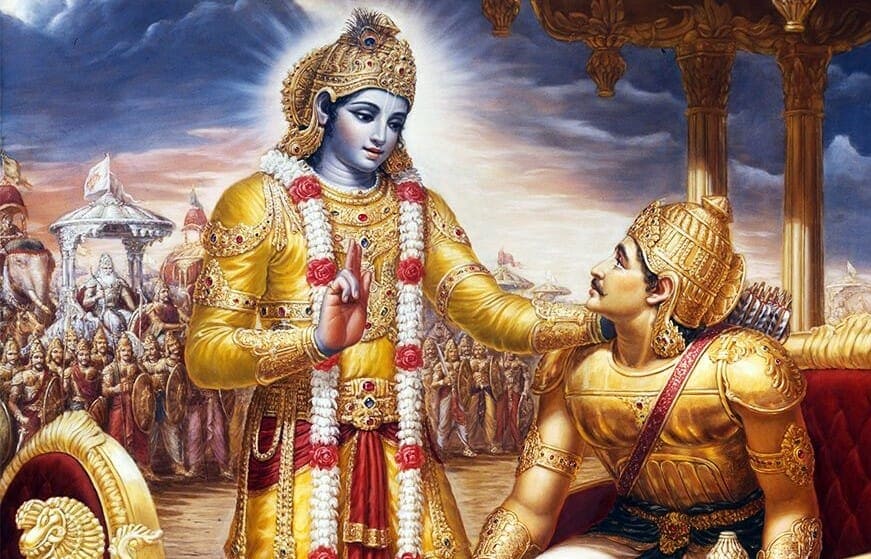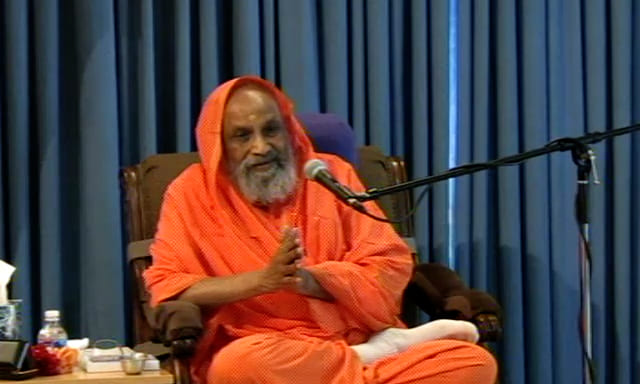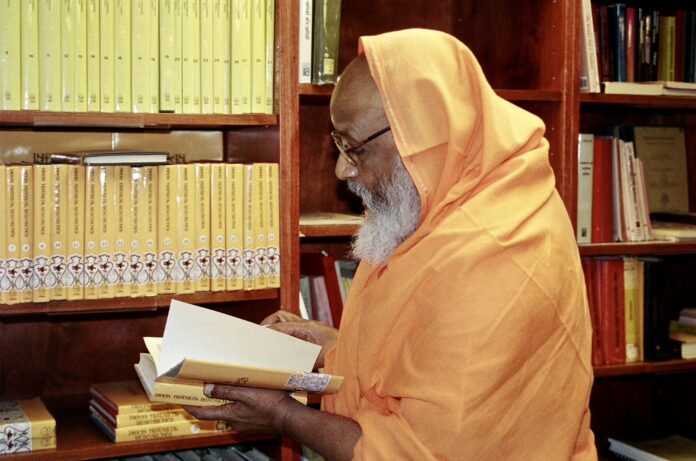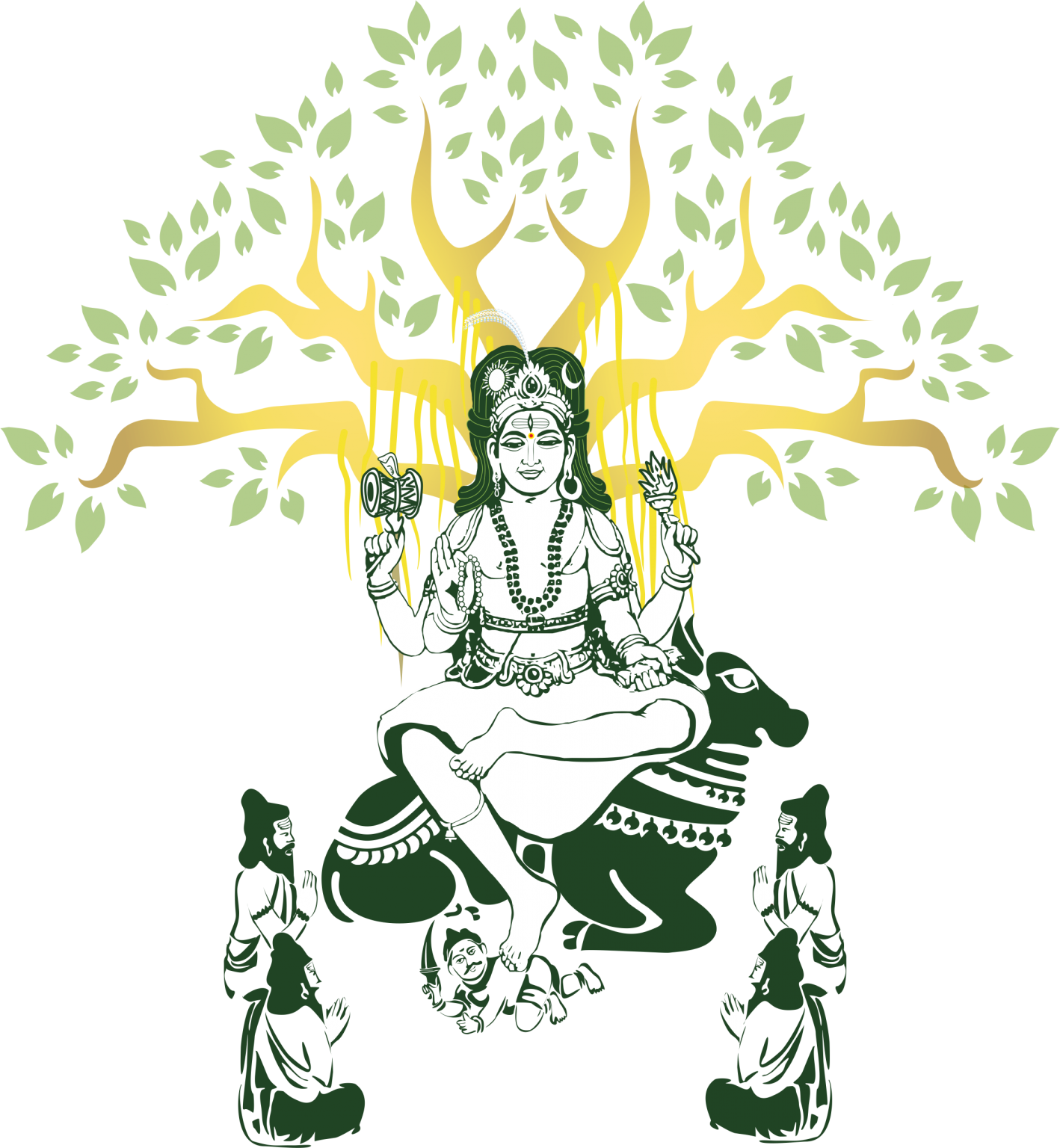Swami Dayananda
[Published in the Arsha Vidya Gurukulam 33rd Anniversary Souvenir, 2019]
I find that Lord Gaṇeśa is very popular in all our remote villages. Even people from non-Indian traditions like the form of Lord Gaṇeśa because they can relate to it, even when they cannot relate to any other form. The written form of Om can be seen in the form of Gaṇeśa. The Om itself cannot be worshipped because you cannot have a form for Om. It is a sound symbol, a pratīka, and not a physical form, a pratimā.
Lord Gaṇeśa is the inspiration for every artist. Each one gives us a form that is unique and beautiful. You cannot worship omkāra in its written form, but you can worship Lord Gaṇeśa, which has a form that suggests the written form of Om.
अगजाननपद्मार्कंगजाननंअहर्निशम्
अनेकदन्तंभक्तानांएकदन्तं उपास्महे।
agajānanapadmārkaṁ gajānanaṁ aharniśam
anekadantaṁ bhaktānāṁ ekadantaṁ upāsmahe|
“We meditate day and night on the one-tusked one who is the sun for the lotus in the form of the face of Pārvatī, the one with the elephant face and the one who is the giver of all desired ends to his devotees.” Gajānanam ekadantam aharniśam upāsmahe. Gaja means elephant and anana means face. Gajānana is one who has the face of an elephant. Ekadanta is the one who has only one danta, tusk. Upāsmahe means ‘we meditate upon,’ and aharniśam means ‘day and night.’ We meditate day and night upon that one who has the face of an elephant and who has one tusk.
Agajānana-padmārkam is a compound word. That which is born is jaḥ. Gaḥ means that which goes. Agaḥ means that which does not move. This refers to a parvata, mountain. The king of the mountain is called parvata-rājā. Agajānana means agāt jāyate, the one who is born of agaḥ, the mountain king. This is Goddess Pārvatī. Pārvatī is called agajā or girijā. In this context, agajānanam is agajayaḥ ananam, the face of Goddess Pārvatī. This face of Pārvatī is likened to the lotus, padma. For a lotus to bloom, the presence of the sun is required.
While the waterlily blooms in the wake of moon at night, the water lotus blooms only when the sun is up. Arka means the sun. So too, Pārvatī’s lotus-like face requires a sun to bloom, and this is Lord Gaṇeśa. He is the one who is the sun, as it were, for the lotus that is the face of Goddess Pārvatī. When she sees Lord Gaṇeśa, she is so happy that her face blossoms. Lord Gaṇeśa is himself gajānana, the one who has the face of an elephant, which is a symbol for all wisdom and all power.
What is anekadantam? This is actually two words: anekadam and tam. The one who gives is daḥ. The one who gives ekam, one thing, is called ekadaḥ. But Lord Gaṇeśa is not the giver of only one thing: he is anekadaḥ, the giver of all that you want. In the second case ending, it becomes anekadam. He gives aneka: dharma, artha, kāma, and mokṣa. You can get everything by his grace. Tam means him. Anekadam tam means unto that Lord, whose grace will help you achieve everything.
For whom is he anekadaḥ? Bhaktānām, for his devotees, those who invoke him. We meditate upon this Lord Gaṇeśa.
The vedic mantra invoking the grace of the Lord Gaṇapati is chanted first before the chanting of Rudram.
ॐ ग॒णानां त्वा ग॒णप॑ति हवामहे
क॒विंक॑वी॒नामु॑प॒मश्र॑वस्तमम्। ज्ये॒ष्ठ॒राजं॒ब्रह्म॑णांब्रह्मणस्पत॒
आन॑श्शृ॒ण्वन्नू॒तिभि॑स्सीद॒साद॑नम्॥
om ga̱ṇānāṁ̎ tvā ga̱ṇapa̍ tigm havāmahe
ka̱viṁ ka̍ vī̱nāmu̍ pa̱maśra̍ vastamam|
jye̱ṣṭha̱rājaṁ̱ brahma̍ ṇāṁ brahmaṇaspata̱
āna̍śśṛ̱ṇvannū̱tibhi̍ssīda̱ sāda̍ nam||
“Through praise we worship you, the Lord of Vedas, the leader of all groups of devas, the visionary of all visionaries (all-knowledge), the one who has great fame through various similes, the most exalted of the knowers of Brahman and the one who shines in the hearts of devotees. Listening to our prayers of praise, please sit at the altar of our hearts with all protective means.”
Here, Lord Gaṇapati is looked upon as parameśvara and not as a given devatā. It is so because he is addressed by the word brahmaṇaspate, “O Lord of brahma – the Veda śāstra.” The word ‘brahma’ here means the body of knowledge known as Veda. Pati means the Lord. Brahmaṇaspate – O Lord of the Veda, parameśvara! The subject matter of the Vedas, like the devatās, rituals, heaven and so on, is not within the range of human perception and inference. It has to be revealed by the source of all-knowledge, the Lord. The ṛṣis are the recipients of this sacred knowledge.
We can also interpret the word brahma as Hiraṇyagarbha, the creator of Brahma. So Gaṇapati here is parameśvara. Gaṇānām tvā havāmahe – We worship you, parameśvara, the Lord, the creator and protector of gaṇas, all living beings including the devas. A deva, deity, is also one of the manifestations of īśvara. “You being the Lord, havāmahe, we worship you, parameśvara, we worship you for a pure mind.” It is a mumukṣu’s prayer. You seek the Lord’s grace to accomplish various goals in life. A human being, though intelligent, many a time becomes helpless. Intelligent living is seeking help when you need it, and here you offer a prayer to ask for help.
Gaṇapati is kavīnām kaviḥ. Kavi means the one who knows the past, present, and future. A good astrologer is also called kavi, as is a poet. Gaṇapati is the kavi of all kavis. All the kavis need the grace of this kavi, even to be a relative kavi.
He is all-knowledge. Gaṇapati being parameśvara, there is no simile for him. In other words, parameśvara is like parameśvara. Vālmīki
said, “rāma-rāvaṇayoryuddham-rāma-rāvaṇayoriva – the battle between Rāma and Rāvaṇa was like the battle between Rāma and Rāvaṇa.” So the mantra says upama-śravastamam.
What is upamā? Upamīyate anayā iti upamā – that by which something is approximated. Many upamās are given in the śruti, such as space to point out the all-pervasiveness of the Lord and sun to point out the effulgence of the Lord. The sun example is also used to represent one being many; there is only one sun, but its reflections are many. One comes to know that in spite of all the varieties of upamās that the śruti gives, the Lord stands far beyond them, his glory being ṛṣati jānāti iti ṛṣiḥ, mantra-draṣṭā – the one who knows is ṛṣi, the seer of mantras infinite. He is upamā-śravastama– the one who is praised in various upamās and yet there is no one equal to him. He stands apart and cannot be compared with anything, which is why the Lord cannot be flattered. Anything one says will fall short of his glory. For the same reason, the Lord can be understood in his transcendental nature as one who is free from all attributes. And everything else is only his manifestation. Thus appreciating parameśvara, havāmahe, we worship.
Jyeṣṭharājam – The one who always shines in the hearts of the devotees is rājā. He also shines in the hearts of even those who are not devotees, but is not recognized by them. One who is to be counted and reckoned with in society is jyeṣṭha.
Naḥ śṛṇvan ūtibhiḥ sādanam āsīda – Listening to our praises, with all protective means, please sit at the altar of fire ritual, sādanam, in our heart. We, your devotees, are praising you, revealing who you are, and these words of prayer merely state your virtues. The more words you have for Bhagavān, the fewer the things which are outside Bhagavān. You see the ananta, limitless, totally as well as severally. All individual objects are also parameśvara, and you can see this up to the quantum level. Any ray of glory is īśvara. The less of you and the more of īśvara, the more you get in life. By our own ndividual presence, we deny the whole. Listening to all these prayers, may you abide in our heart and protect us.




